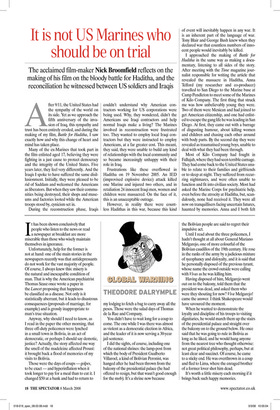I t has been shown conclusively that people who listen to
the news or read a newspaper at breakfast are more miserable than those who wisely maintain themselves in ignorance.
Unfortunately, help for the former is not at hand: one of the main stories in the newspapers recently was that antidepressants do not work for the vast majority of people. Of course, I always knew this: misery is the natural and inescapable condition of man. That is why the American psychiatrist Thomas Szasz once wrote a paper in the Lancet proposing that happiness be classified as a disease. Not only is it statistically aberrant, but it leads to disastrous consequences (proposals of marriage, for example) and is grossly inappropriate to man’s true situation.
Anyway, why should I need to know, as I read in the paper the other morning, that three off-duty policemen were lynched in a small town in Bolivia, in an act of democratic, or perhaps I should say demotic, justice? Actually, the story affected me way the smell of the madeleine affected Proust: it brought back a flood of memories of my visits to Bolivia.
Those were the days of coups — golpes, to be exact — and hyperinflation when it took longer to pay for a meal than to eat it. I changed $50 at a bank and had to return to my lodging to fetch a bag to carry away all the pesos. Those were the salad days of Thomas de la Rue and Company.
You didn’t have to wait long for a coup to come. The one while I was there was almost as violent as a democratic election in Africa, and the leader of it is now serving a 30-year jail sentence.
I did the sights, of course, including one of the national shrines: the lamp-post from which the body of President Gualberto Villaroel, a kind of Bolivian Peronist, was hanged after he had been thrown from the balcony of the presidential palace (he had offered to resign, but that wasn’t good enough for the mob). It’s a shrine now because the Bolivian people are said to regret their impulsive act.
Until I read about the three policemen, I hadn’t thought at all about General Mariano Melgarejo, one of more colourful of the Bolivian caudillos of the 19th century. He rose in the ranks of the army by a judicious mixture of sycophancy and disloyalty, and it is said that he personally disposed of the previous tyrant, whose name the crowd outside were calling with Vivas as he was killing him.
Having disposed of him, Melgarejo went out on to the balcony, told them that the president was dead, and asked them who were they shouting for now? Viva Melgarejo! came the answer. I think Shakespeare would have savoured the moment.
When he wanted to demonstrate the loyalty and discipline of his troops to visiting dignitaries, he would march them up the stairs of the presidential palace and straight over the balcony on to the ground below. He once said that he was going to rule in Bolivia as long as he liked, and he would hang anyone from the nearest tree who thought otherwise: not great political philosophy, perhaps, but at least clear and succinct. Of course, he came to a sticky end. He was overthrown in a coup and fled to Lima, where the enraged brother of a former lover shot him dead.
It’s worth a little misery each morning if it brings back such happy memories.


















































































 Previous page
Previous page